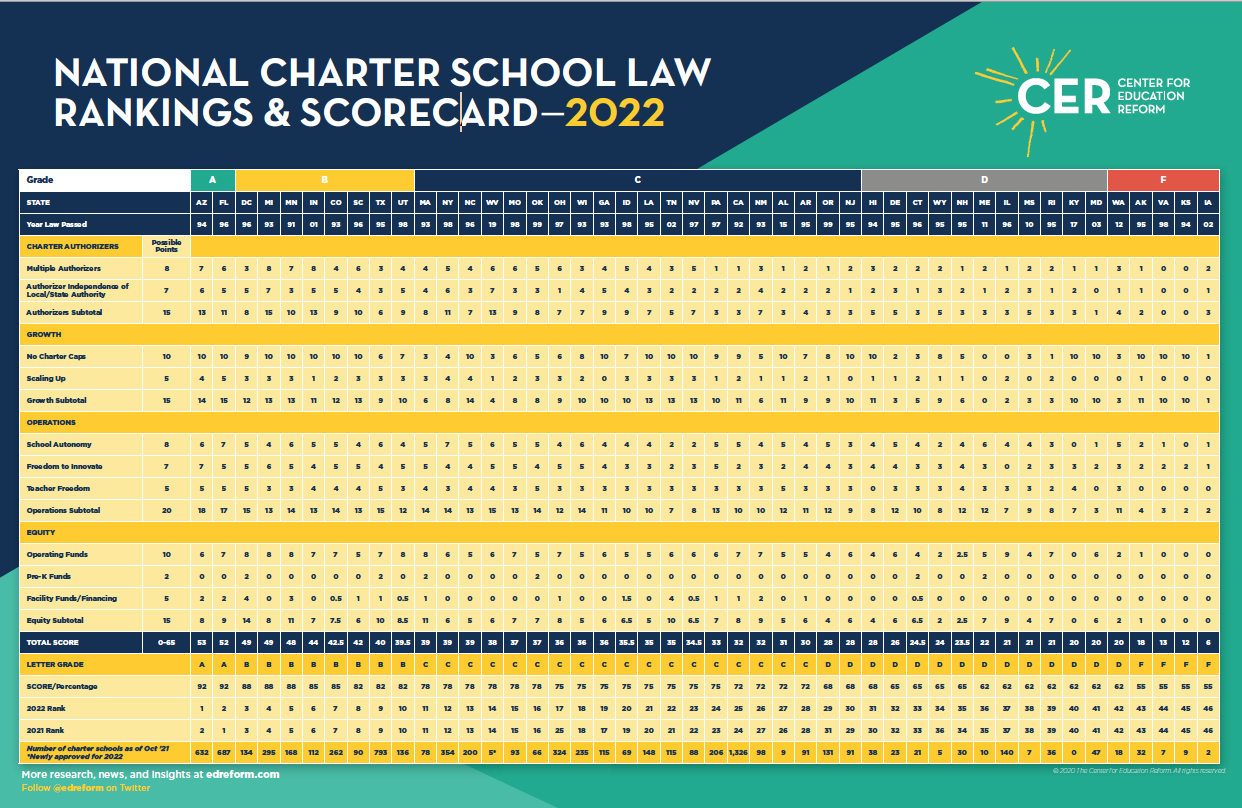BREAKING: ARIZONA RECLAIMS FIRST PLACE ON NATIONAL CHARTER LAW RANKINGS
States continue to improve education opportunity for students despite special interest opposition
WASHINGTON, D.C. — As charter schools rally in Washington, DC this week, bringing hundreds of charter leaders to pressure the Biden Administration to cease its regulatory actions to slow these opportunities, a new report from the Center for Education Reform (CER) finds more states improving their charter school laws again in the ‘21-22 state sessions, following on a year where 14 states improved their charter laws during the Covid crisis.
While both states have aggressively responded to the needs of parents to provide a wide array of education opportunities, Arizona made a comeback to overtake Florida as the first place winner in the advancement of charter schools. The Grand Canyon State increased funding and the proportion of students in charter schools, which have been innovatively creating new models of education – like microschools – which appeal to a broad array of parents.
“The active engagement by parents for great education – in every kind of community – has never been stronger,” said CER’s Jeanne Allen. Charter schools provide the diversity of education, focus, size, scope and approach that parents desperately want, especially today.”
Approximately twenty-eight percent of public schools in Arizona are charter schools and roughly twenty percent of students are public charter school students. In Florida, seventeen percent of public schools are charters and approximately twelve percent of students attend a charter school.
 “We’ve seen first hand in the District of Columbia the power of charter school choices to transform entire communities. We salute all who are seeking equity for children and encourage more states to create better educational options for families,” said Donald Hense, CER Chairman and Founder of
“We’ve seen first hand in the District of Columbia the power of charter school choices to transform entire communities. We salute all who are seeking equity for children and encourage more states to create better educational options for families,” said Donald Hense, CER Chairman and Founder of
Friendship Public Charter Schools. DC retains a high score in the rankings, and nearly fifty percent of students attend a charter school.
Other highlights of the 2022 National Rankings:
- New Jersey drops to a D. Over the past year, the Murphy Administration has been arbitrarily denying charter applications in high demand urban communities, as well as expansion plans by pioneering charter schools, despite their legal contracts permitting more students.
- New Mexico moves up a notch. After years of disregarding financial equity for charters, the state significantly boosted support for charter school facilities this year.
- Ohio jumped eight spots. While retaining its grade of C, Ohio’s positioning improved significantly, expanding chartering throughout the state beyond the original big 8 failing school districts, and increasing funding.
Since 1996, CER’s National Charter School Law Rankings and Scorecard has been the most reliable national measure for policymakers and education leaders of the extent to which charter school laws do what they were intended to do — foster the creation of diverse, independent public schools that provide a maximum number of families with options. To review the latest rankings visit the rankings homepage on edreform.com. For a complete analysis of each charter school law, along with other state policy efforts, check out the interactive Parent Power! Index.
For interviews and questions, please call Michael Musante at 202-750-0016
 Jeanne Allen congratulates Gov. Ducey on his state’s accomplishment.
Jeanne Allen congratulates Gov. Ducey on his state’s accomplishment.
About CER – Working to education innovation and opportunity for nearly 3 decades, the Center for Education Reform also today administers the $1 Million Yass Prize for Sustainable, Transformational, Outstanding and Permissionless Education to reward education providers who deliver for students no matter the challenges. Applications open through July 15 for more than $10 million in prizes and the chance to become part of a new community to advance STOP principles.

